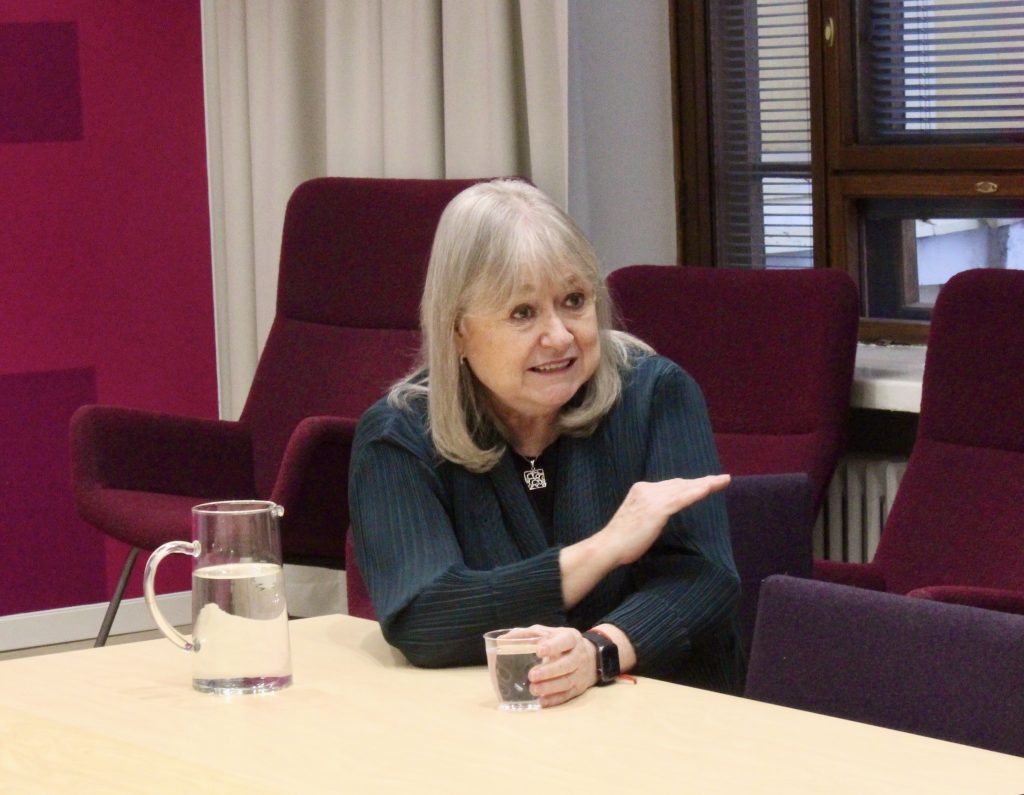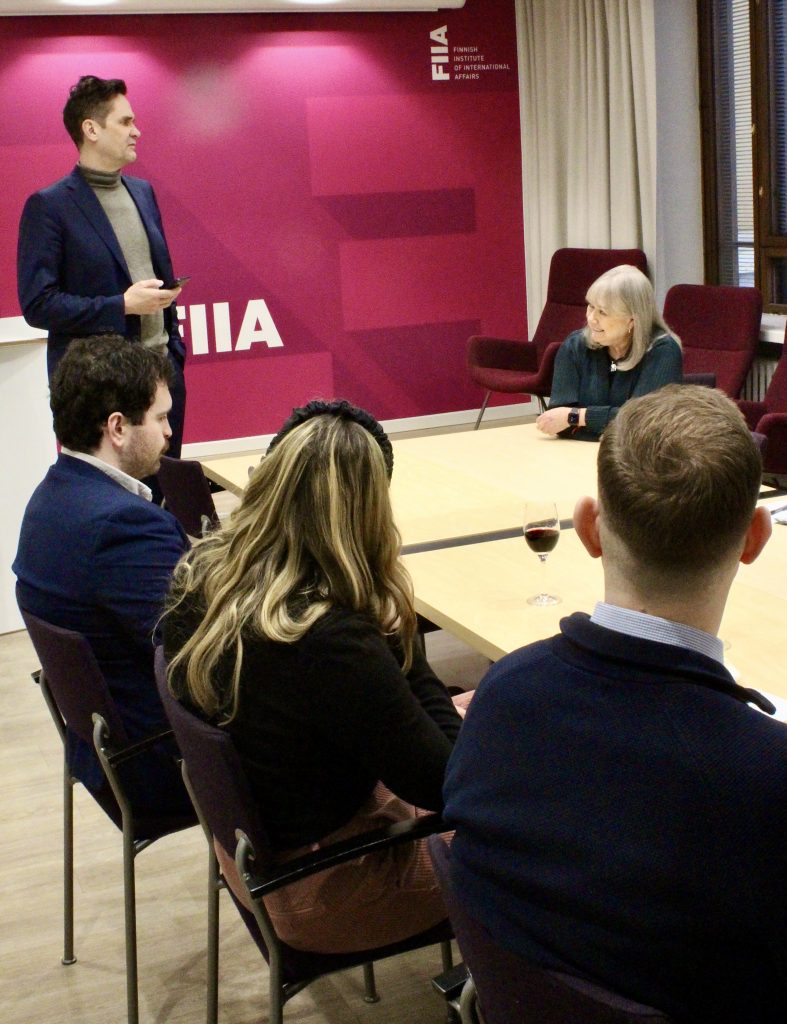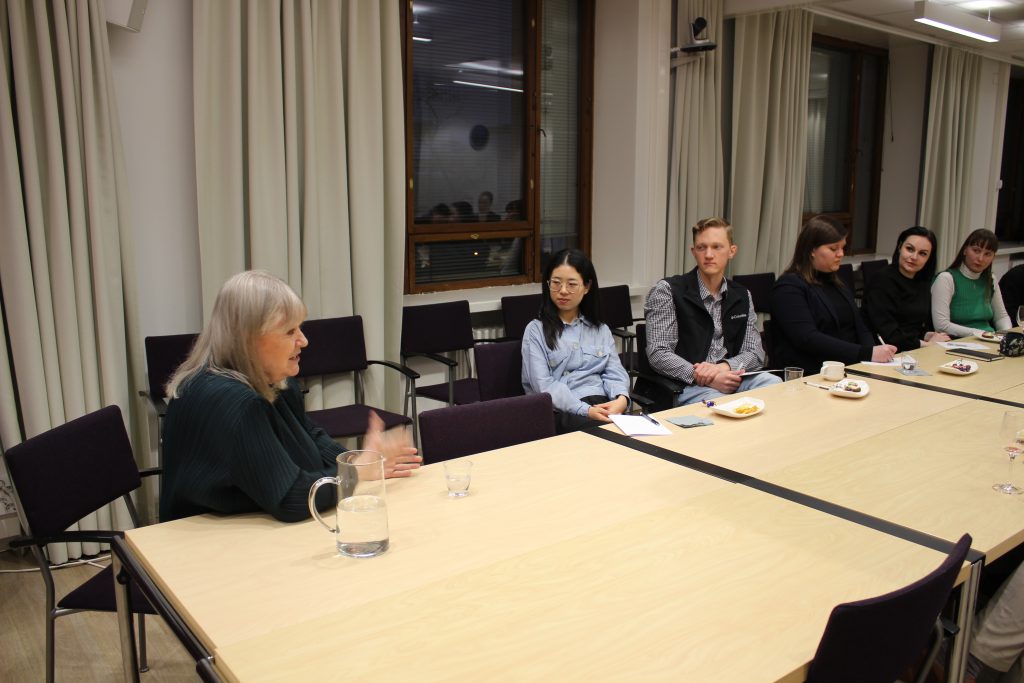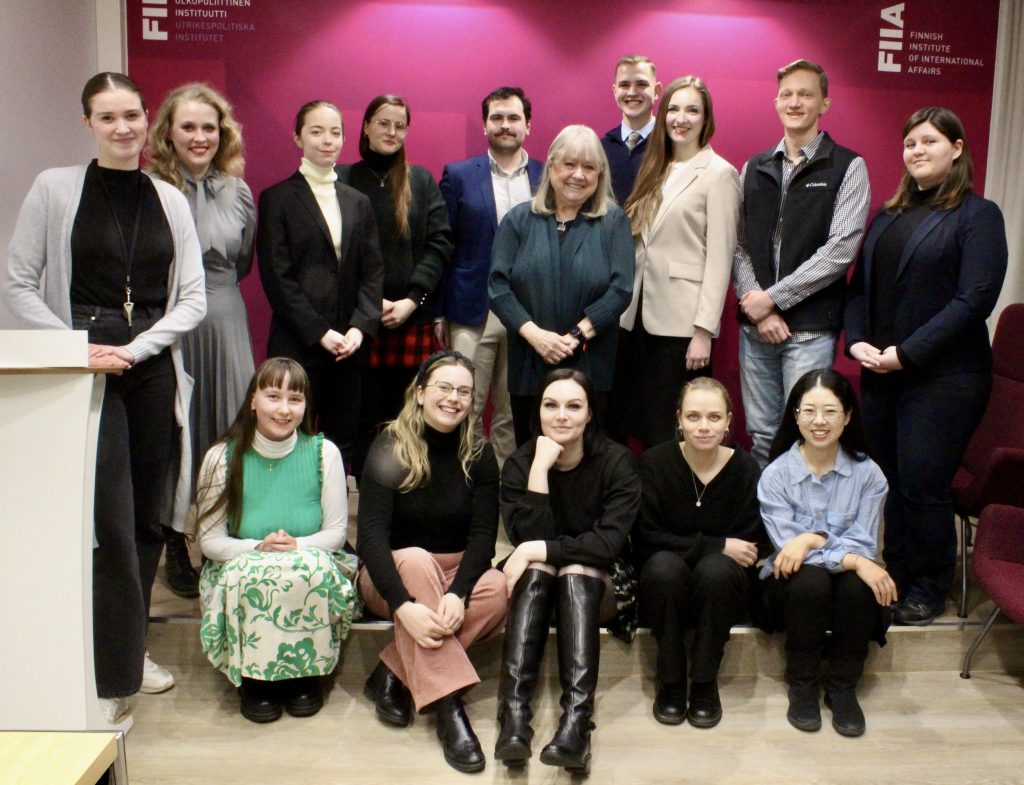This post is written by Local Task Force (LTF) members Helena, Eugenia and Ruth:
Last week, volunteers in the Una Europa Helsinki Local Task Force had the opportunity to meet with Mrs. Susana Malcorra, the former Minister of Foreign Affairs and Worship for the Republic of Argentina and the former Chief of Staff of the UN Secretary-General, as she visited Helsinki to attend a discussion panel hosted by the Finnish Institute for International Affairs (FIIA). As a former UN official, as well as the founding member of the advocacy organization Global Women Leaders (GWL), she brought two crucial messages: women’s empowerment and the future of multilateralism in world politics.
The power to not take yourself too seriously
LTF sat down with Mrs. Malcorra on Monday evening, the day before her speech at the FIIA panel. As she said, she came to the meeting straight from the airport, since her plane got delayed – but it was one that she specifically asked to have, as engaging with young people, women especially, is something she considers a crucial part of her job.
The former chief of Argentinian foreign policy started her career rather unexpectedly in the private sector: engineer by training, she spent the first 25 years working for IBM and Telecom Argentina. As a woman in a male-dominated field, her beginnings were challenging – as she told us, when she showed interest in a sales position in her IBM entrance interview, she was told that the company does not employ women in sales. However, determination is one of her qualities that you notice almost immediately. “I was ready to jump across the table and attack the interviewer,” she told us, laughing. Later she learned that he asked the question on purpose, to see her reaction – and a few months later, she was working the sales job as the only woman in the team.

Willingness to take risks is what also brought her to the UN. Despite being on the track to one day becoming a top manager, she left IBM after strong disagreements with the new leadership. “One night after handing in my resignation, I remember I couldn’t sleep,” she said. “I was full of doubts about my decision.” She told us it was her husband who assured her that there is nothing to worry about. And he was right. She got the offer to apply for a managerial position in the UN World Food Programme in Rome, and despite starting as an underdog in an openly political hiring process, she got the job. “I was told I won’t get in because other countries had strong candidates,” she explained. “If you know me, you also know that this is the last thing to tell me. I had no political backing from my country, but after 11 interviews I was offered the position.”
Mrs. Malcorra shared that one of the reasons for this success was her ability to look at things from a different angle – she brought her own vision and ideas but was also willing to listen to others. Her sense of humor also helped. “I believe it’s important to talk human,” she said and emphasized that this is a transformational quality often brought to the team by women. The support of female leaders and women’s empowerment is one of her strongest topics.

“I will believe in equality when I see non-brilliant women at the top”
“We started the GWL after running for the position of UN Secretary-General. There were seven of us, all highly qualified women. None of us got the job. But we realized that we are not just rivals – we should be partners in promoting women’s empowerment,” stated Mrs. Malcorra when explaining the beginnings of the organization GWL Voices for Change and Inclusion, an advocacy group for multilateralism and gender equality consisting of over 60 global female leaders. Since 1945, women have held just 12% of the top jobs at 33 of the biggest multilateral institutions (Reuters). Mrs. Malcorra shared with us numbers and facts on the reason why considering the role of women in higher political institutions is more urgent than ever. She mentioned how, for instance, a gender balance in the Parliament lowers the rate of violence – in other words, if you have women at the table, you are likely to have a lower degree of violence and to find a more sustainable solution.
Luckily for us, most of the meeting was based on a Q&A, which created a lively debate. We asked Mrs. Malcorra what she thought about gender quotas and how she judged the idea that every decision should be based on meritocracy. “Meritocracy is important, but not enough” she pointed out, as gender equality is very much a power struggle. Policies need to accelerate this process and quotas are a necessary tool – “I will believe in equality when I will see non-brilliant women at the top positions, as men I see every day”.

“Dare!”
We also asked for some advice on how to effectively communicate in male-centered debates. Self-esteem is the stepping stone to gaining influence. Women tend to focus on what they do not know or on the fact that they do not know enough to apply for a certain job, express an opinion, etc. On the men’s side – surprise surprise! – the same thoughts leave space for a solid “I can do it”-attitude. Women should be encouraged to dare, try, and get more confidence along the way. A new job, for example, should feel like an oversized coat – too baggy and uncomfortable at first, then, step by step, we grow “muscles” and fill the gap. Now the coat fits perfectly, and we realized we made what we thought impossible. Slowly it will even feel tight, and that means new challenges must be considered. Women in top roles are necessary, as she highlights: “If you are not engaged, you are not shaping the agenda”.
“There are no right or wrong decisions”
A delicate but maybe inevitable question once we learned Mrs. Malcorra has a child, was whether it has been difficult to balance career and family. “You never get it right”, she laughed. It was difficult, indeed, and compromises were a daily occurrence. Her partner was essential to share responsibilities and some mistakes are inevitable. The support of her family can be represented by the honest dialogue with her son after a broken promise: “Mom, I want you to keep your promises, but I don’t want you to quit your job”. It was uplifting and inspiring to hear about the good and the bad, with moments of uncertainty that every human has. It is ok to doubt, but there are no right or wrong decisions. There are decisions. In the case we find them wrong, we work to make them right.

“Multilateralism will remain indispensable”
As Mrs. Malcorra emphasized, women’s rights are threatened once again. In her opinion, this process is closely tied to the retreat of multilateralism – the order of international politics centered around international law, the UN, and the importance of giving voice to smaller countries and marginal groups instead of letting the most powerful players turn global politics into a cut-throat competition among the fittest. This was the topic of the panel titled Will multilateralism survive in the age of strategic competition?, hosted by FIIA on Tuesday 28th February, where Mrs. Malcorra was the keynote speaker.
She emphasized that the practice of international institutions working together is in crisis due to populism, nationalism, digitalization, and an increasing lack of trust. There is an urgent need to strengthen the practical values of multilateralism, as well as cooperation in health, trade, and climate change, since these are challenges not even the biggest states can face on their own. The war in Europe is a grave threat to multilateralism both politically and culturally. But as Mrs. Malcorra argued, it should not be forgotten that the multilateral system has to accommodate not just the democratic and liberal governments that work together, but the undemocratic ones as well.
Regional multilateralism is emerging as one of the alternative forms of international cooperation. As was emphasized by Mr. Haavisto, the Finnish Minister of Foreign Affairs who also attended the panel, “multilateralism can work in conventional forms, but it also needs to adapt to new realities. While it might be undermined in the future, it will remain indispensable.” Inequalities in regional development should also be considered when trying to strengthen multilateralism, especially by the developed countries including the EU and Finland.
All in all, the survival of the multilateral international framework is not just a point for abstract academic discussion. On the contrary, the well-being of millions of people around the world is closely tied to it, with women and girls being among the most affected groups. One of the main messages in Mrs. Malcorra’s argumentation at our Monday meeting was that not power politics, but politics focusing on the well-being of everyone in the society has to be the path we take if we want to live in a more just and equal world.

Conclusion
We live in turbulent times, and thinking about the future can sometimes be a gloomy, worrying experience. However, it is only one side of the coin, since times of great changes can also lead to the creation of something new and better. What is needed are people with a vision and confidence to advocate for such a change. Both of our encounters with Mrs. Malcorra left us with a feeling of new energy and optimism that such people are out there, and what more, dedicate considerable time and energy to advocating for and inspiring others. So put your coats on, ladies (and gents), and let’s dare!

Written by Helena Drdlová, Eugenia Castellazzi and Ruth Nawakwi
Photos by Stinne Vognæs (1-4, 6) and FIIA (5)


You guys are really doing a very recommendable thing. Congratulations. Keep at it.
The article has articulated reals of empowerment
So educative